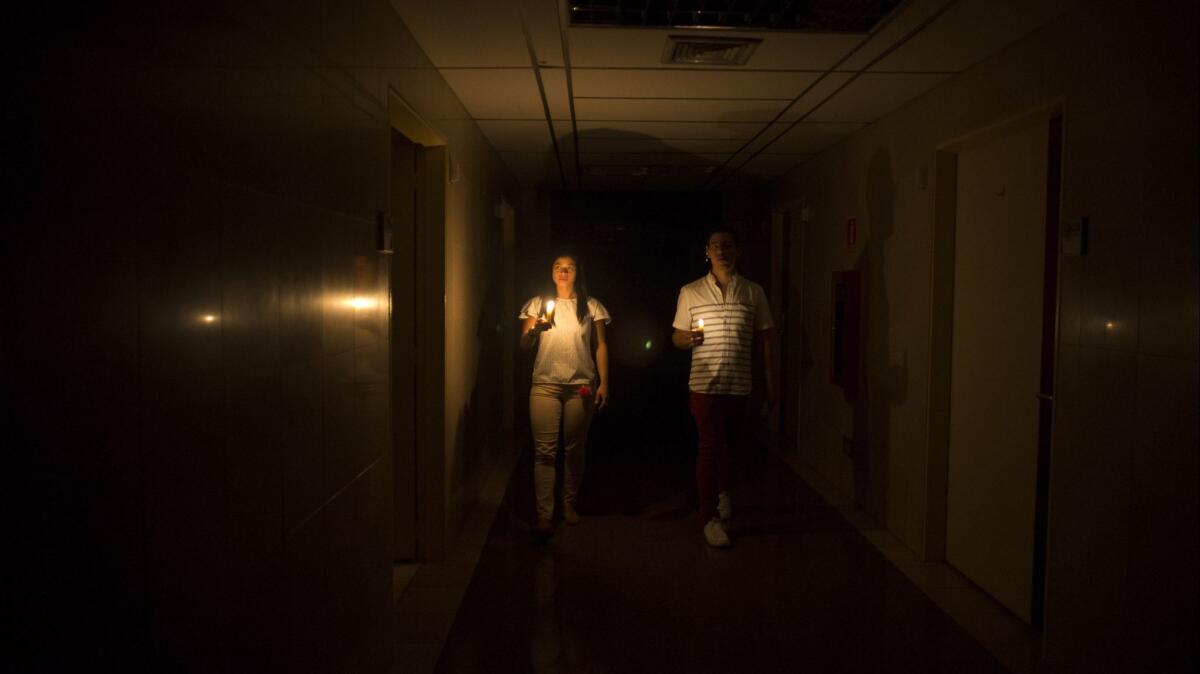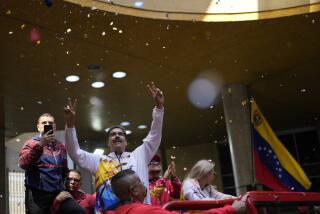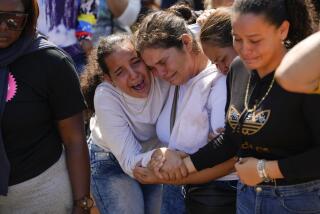Massive Venezuela blackout raises tensions amid political and economic crises

A 20-hour blackout in Venezuela shuttered schools and public services across the country, ratcheting up tensions for a populace already struggling amid economic and political crises.
Electricity was finally being restored to parts of the country Friday afternoon after a breakdown in the national power grid hit nearly the entire nation.
Power outages occur frequently in the capital, Caracas, and the rest of the country, but this week’s blackout was one of the most serious in recent years.
It hit at rush hour Thursday, trapping hundreds of people for hours in the Caracas subway and leaving countless others to find their way home on darkened streets and paths.
The outage sparked fears of increased violence in the capital, which already suffers high levels of violent crime, and put hospital patients in danger.
Carlos Manriquez was standing on a Caracas street Friday trying to find a way to get his 60-year-old sister to the hospital for her dialysis treatment.
The metro wasn’t running. There were no buses. Even if they made it, the 42-year-old said, there was no guarantee the hospital would have generators so his sister could get the treatment.
“How is it possible that our country has arrived in this situation — so dramatic, so sad — where we are so desperate?” Manriquez asked.
Zulay Garcia just wanted water for her boys, ages 2 and 4. The 32-year-old in Caracas’ Baruta neighborhood was trying to make a purchase but having no luck.
“It’s been more than 24 hours without services, water, telephone and electricity, and I need water for the children, food for the children,” she said, her frustration growing. “They want to charge me for water in dollars and I have no dollars.”
At the national level, the blackout quickly led to finger-pointing and accusations of sabotage among sitting President Nicolas Maduro, opposition leader and self-declared interim president Juan Guaidó, and U.S. officials.
Communication Minister Jorge Rodriguez said a hydroelectric complex in eastern Venezuela had been sabotaged, saying an attacker or attackers “tried to leave the country without power for several days.” He did not specify the nature of the sabotage he was alleging.
Maduro was more pointed, writing on Twitter: “The electricity war declared and directed by the imperialist United States against our people will be overcome!”
Critics say the Maduro government has let the electric power system fall into decline, a symptom of the country’s deteriorating infrastructure.
Guaidó, in a video on social media, blamed the outage on “corruption in Miraflores,” a reference to the presidential palace.
The U.S., which supports Guaidó’s claim to the presidency and his calls for Maduro’s resignation, also laid the blame at the sitting president’s feet.
Elliott Abrams, special U.S. envoy for Venezuela, called the outage “a reminder that the country’s once quite sophisticated infrastructure has been plundered and allowed to decay under Maduro’s misrule.”
Secretary of State Michael R. Pompeo said on Twitter: “Maduro’s policies bring nothing but darkness.” He followed up with, “No food. No medicine. Now, no power. Next, no Maduro.”
Maduro is increasingly unpopular and isolated, charging that the opposition is conspiring with the U.S. and other foreign governments in an attempt to overthrow him.
Guaidó, an opposition politician who declared himself interim president on Jan. 23, has enlisted the support of more than 50 countries as well as multinational bodies in support of his calls for Maduro to resign.
Abrams said Friday that the U.S. had information that most members of the military want Maduro to step down.
Although up to 700 military personnel have deserted in recent weeks, the command appears to still favor Maduro, a former bus driver and union leader whose reelection in May was widely viewed as a sham.
The handpicked successor of the late President Hugo Chavez, Maduro was elected in April 2013, a month after Chavez died of cancer. Since then, rising poverty and crime in the once wealthy oil-producing nation have prompted a massive exodus of Venezuelans fleeing the country in search of better lives.
Hyperinflation and scarcities of food, medicine and basic goods from car parts to coffins have made life miserable for the millions who remain.
Many streets in Caracas remained in eerie darkness late Friday, with many residents staying inside for safety.
But Defense Minister Vladimir Padrino Lopez, who’d toured the city Friday, told reporters that conditions were “normal.”
Special correspondent Mogollon is based in Caracas. Times staff writer Tracy Wilkinson contributed to this report.
More to Read
Start your day right
Sign up for Essential California for news, features and recommendations from the L.A. Times and beyond in your inbox six days a week.
You may occasionally receive promotional content from the Los Angeles Times.






